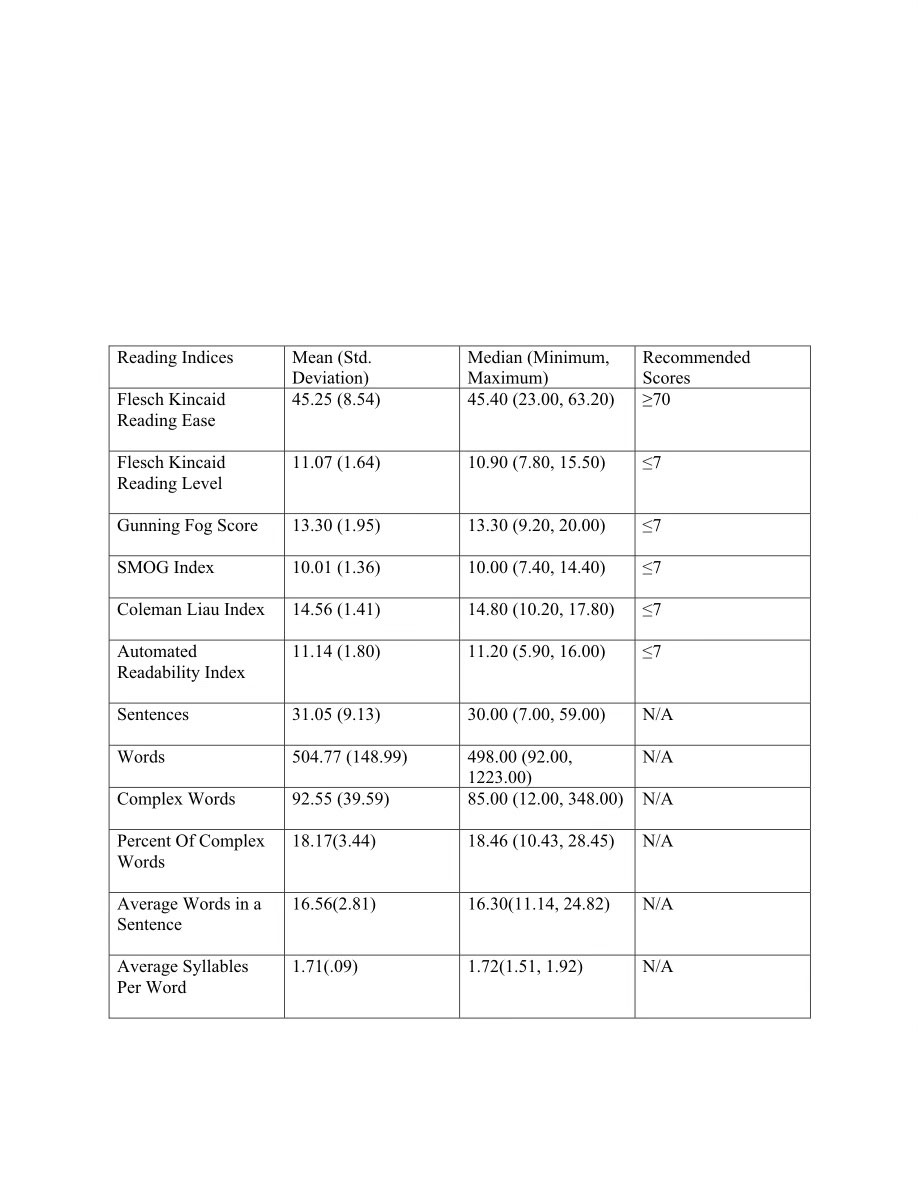Session Information
Session Type: Poster Session C
Session Time: 1:00PM-3:00PM
Background/Purpose: Patient education materials (PEMs), obtainable from online resources, can be accessed by patients and physicians and used to supplement the medical information provided by the physician. Well-constructed PEMs serve to promote health literacy (HL) which is the degree to which individuals obtain, process, and understand the basic information they need to make appropriate health decisions. As one-third of US adults have trouble reading and acting on health-related information, it is important that PEMs are easy-to-read and comprehend. The Center for Disease Control recommends the level of readability for PEMs to be at the eighth-grade level, while the National Institute of Health and the American Medical Association recommends the level not higher than the sixth-grade level.
Our objective was to evaluate the readability and comprehension (RC) of PEMs available on the American College of Rheumatology’s (ACR) website.
Methods: We examined the RC of PEMs available on the ACR website. The following measures were used to determine RC: (a) Flesch Kincaid Readability Ease (FKRE): measures readability (0 to 100, where higher scores indicate greater ease of reading) (Goal ≥70), (b) Flesch Kincaid Grade Level (FKGL): evaluate the U.S grade level required to comprehend the text on a page. (Goal ≤7th grade), (c) Gunning Fog Score (GFS): estimates the number of formal education years required to understand the text on the first reading (Goal ≤7), (d) Simple Measure of Gobbledygook (SMOG) Index: estimates the education years required to comprehend the written materials, (e) Coleman Liau Index (CLI): assesses the U.S grade level necessary to understand text material, and (f) The Automated Readability Index (ARI): determines the grade level required for a reader to understand a passage.
Results: We accessed 85 PEMs on the ACR website. Mean (SD) FKRE was 45.25 (8.54). FKRE 30-50 equates to “difficult to read, best understood by college graduates.” Mean (SD) FKGL was 11.07(1.64), representing an eleventh-grade reading level (Table 1). Mean (SD) GFS was 13.30 (1.95), which represents 13 years of formal education years required to understand the text on the first reading. Mean (SD) SMOG Index was 10.01(1.36), which represents ten years of education required to comprehend the written materials. Mean (SD) CLI and ARI were 14.56 (1.41) and 11.14 (1.80).
Conclusion: Current ACR web-based patient education materials are not easy to read or comprehend, and they are not aligned with the reading levels recommended by national organizations. We recommend the revision of these PEMs to incorporate the recommended reading and comprehension metrics that will make them more patient-friendly.
To cite this abstract in AMA style:
Nweke U, Hassan S, Ahmad U, Jolly M. Are the American College of Rheumatology’s Web-Based Patient Education Materials Easy for Patients to Read and Comprehend? [abstract]. Arthritis Rheumatol. 2022; 74 (suppl 9). https://acrabstracts.org/abstract/are-the-american-college-of-rheumatologys-web-based-patient-education-materials-easy-for-patients-to-read-and-comprehend/. Accessed .« Back to ACR Convergence 2022
ACR Meeting Abstracts - https://acrabstracts.org/abstract/are-the-american-college-of-rheumatologys-web-based-patient-education-materials-easy-for-patients-to-read-and-comprehend/

